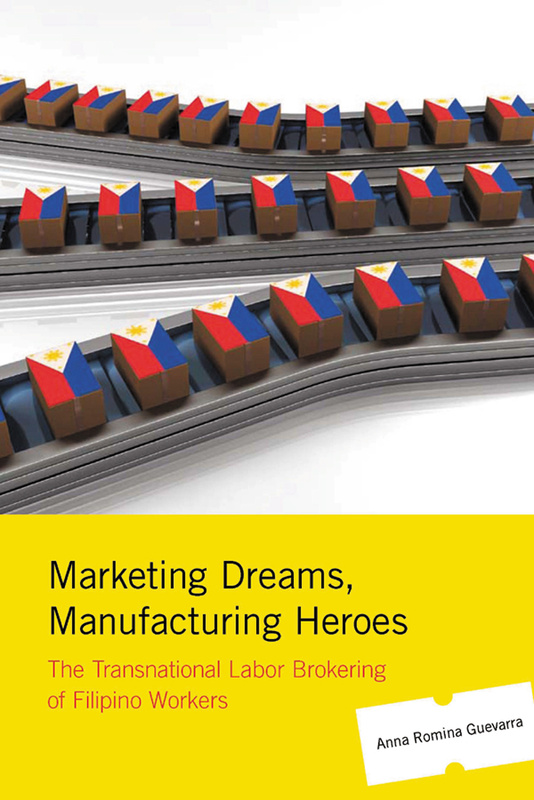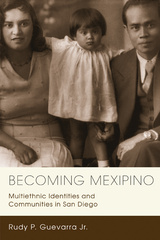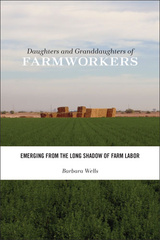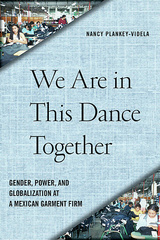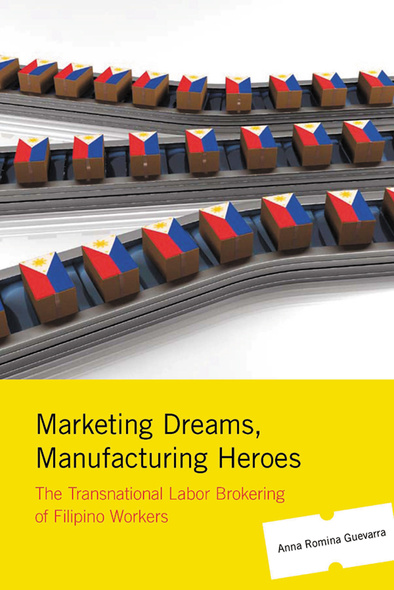
274 pages, 6 x 9
Paperback
Release Date:30 Sep 2009
ISBN:9780813546346
Hardcover
Release Date:30 Sep 2009
ISBN:9780813546339
Marketing Dreams, Manufacturing Heroes
The Transnational Labor Brokering of Filipino Workers
Rutgers University Press
In a globalized economy that is heavily sustained by the labor of immigrants, why are certain nations defined as "ideal" labor resources and why do certain groups dominate a particular labor force? The Philippines has emerged as a lucrative source of labor for countries around the world. In Marketing Dreams, Manufacturing Heroes Anna Romina Guevarra focuses on the Philippines—which views itself as the "home of the great Filipino worker"—and the multilevel brokering process that manages and sends workers worldwide. She unravels the transnational production of Filipinos as ideal migrant workers by the state and explores how race, color, class, and gender operate.
The experience of Filipino nurses and domestic workers—two of the country's prized exports—is at the core of the research, which utilizes interviews with employees at labor brokering agencies, state officials from governmental organizations in the Philippines, and nurses working in the United States. Guevarra's multisited ethnography reveals the disciplinary power that state and employment agencies exercise over care workers—managing migration and garnering wages—to govern social conduct, and brings this isolated yet widespread social problem to life.
A splendid and hard-hitting book that exposes the campaigns by some governments to urge their citizens to work overseas, a key and virtually unnoticed aspect of economic globalization.
Marketing Dreams, Manufacturing Heroes brings the intricate workings of the Philippine state in brokering transnational migration into sharp critical relief. Anna Romina Guevarra offers an exemplary piece of scholarship that cuts across various scales of complexities and levels of analyses which will define the contours of future debates and research agendas on migration.
Guevarra's carefully researched, richly textured ethnographic study provides a compelling analysis of the employment agencies that recruit, mold, and market Filipina nurses and domestic workers for export as 'model workers' to the United States and around the globe. Marketing Dreams, Manufacturing Heroes offers a valuable contribution to the literature on migration as well as that on carework.
An accessible and clearly written book that contains important empirical findings and lucid observations about the social discourses and practices of labor brokerage. Anna Guevarra contributes to a better understanding of key actors in transnational migration and the cultural and ideological underpinnings of a major part of the Filipino export-oriented care service economy.
Marketing Dreams, Manufacturing Heroes offers a comprehensive account of the Philippine state's role as a labor broker. This book strives to envision new ways we might address global inequalities by tapping into the shadow side of global migration—the collective power offered by Filipino migrants' repressed feelings, frustrated dreams, and personal discontents.
Marketing Dreams, Manufacturing Heroes is a highly original and well-researched book that makes major significant contributions to the scholarly literature on contemporary international labor migration.
Guevarra's take on the messy and often contradictory ways that all actors - the state, labor agencies, and workers - internalize and function with ideologies of labor brokerage takes us deep into the micro-processes of migration ... A calculated and forceful critique against the systems of capitalism that broker labor and commodify people.
A splendid and hard-hitting book that exposes the campaigns by some governments to urge their citizens to work overseas, a key and virtually unnoticed aspect of economic globalization.
Marketing Dreams, Manufacturing Heroes brings the intricate workings of the Philippine state in brokering transnational migration into sharp critical relief. Anna Romina Guevarra offers an exemplary piece of scholarship that cuts across various scales of complexities and levels of analyses which will define the contours of future debates and research agendas on migration.
Guevarra's carefully researched, richly textured ethnographic study provides a compelling analysis of the employment agencies that recruit, mold, and market Filipina nurses and domestic workers for export as 'model workers' to the United States and around the globe. Marketing Dreams, Manufacturing Heroes offers a valuable contribution to the literature on migration as well as that on carework.
An accessible and clearly written book that contains important empirical findings and lucid observations about the social discourses and practices of labor brokerage. Anna Guevarra contributes to a better understanding of key actors in transnational migration and the cultural and ideological underpinnings of a major part of the Filipino export-oriented care service economy.
Marketing Dreams, Manufacturing Heroes offers a comprehensive account of the Philippine state's role as a labor broker. This book strives to envision new ways we might address global inequalities by tapping into the shadow side of global migration—the collective power offered by Filipino migrants' repressed feelings, frustrated dreams, and personal discontents.
Marketing Dreams, Manufacturing Heroes is a highly original and well-researched book that makes major significant contributions to the scholarly literature on contemporary international labor migration.
Guevarra's take on the messy and often contradictory ways that all actors - the state, labor agencies, and workers - internalize and function with ideologies of labor brokerage takes us deep into the micro-processes of migration ... A calculated and forceful critique against the systems of capitalism that broker labor and commodify people.
Anna Romina Guevarra is an assistant professor of sociology and Asian American studies and affiliated faculty of gender and women's studies at the University of Illinois at Chicago.
1 Home of the Great Filipino Worker
2 Cultivating a Filipino Ethos of Labor Migration
3 Governing and (Dis)empowering Filipino Migrants
4 Delivering "Our Contribution to the World" (OCW)
5 Selling Filipinas' Added Export Value
6 Living the Dream
7 Securing their Added Export Value
8 Conclusion
2 Cultivating a Filipino Ethos of Labor Migration
3 Governing and (Dis)empowering Filipino Migrants
4 Delivering "Our Contribution to the World" (OCW)
5 Selling Filipinas' Added Export Value
6 Living the Dream
7 Securing their Added Export Value
8 Conclusion

